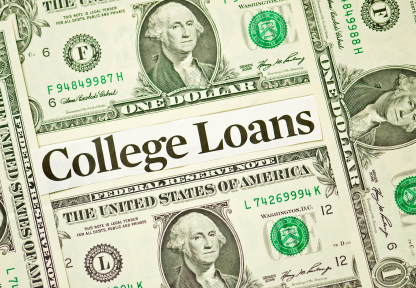Bundle Your Education Loans Cheaply
The Eye of the Beholder
Very few students are in a position to complete their college education without accumulating some level of debt. The rising cost of education in the United States forces all but the most fortunate of students to rely on education loans to help them pay for college. Over the course of a college career, most students will take out several education loans, either through the Federal government or through private lending institutions.
While student loans are a vital part of the college equation, they can create a burden for fresh graduates just entering the workforce. It may be some time before graduates reach their full earning potential, and while they are working their way up the career ladder their loans must be repaid. To help lessen the financial burden of outstanding student loans, many graduates turn to loan consolidation as a way to better manage their college debt.
By consolidating their outstanding loans, graduates can lower their monthly payments and reduce their immediate financial burden. But loan consolidation is not for everyone, and students need to consider both their current financial circumstances, as well as their future earning potential, before pursuing any loan consolidation services.
What is Loan Consolidation?
Essentially, when students consolidate their outstanding education loans they are securing a new loan that will pay off all of their student debt, plus fees and penalties, leaving them with a single outstanding student loan. Ideally, the new “consolidated loan” will reduce the borrower’s monthly payments, and in many cases lower their overall interest rates.Federal Direct Consolidation Loans are available through the U.S. Department of Education for graduates with outstanding Federal student loans. Private consolidation loans are also available through private lenders for eligible graduates with two or more outstanding private, or alternative, loans. The purpose of loan consolidation is to ease the immediate financial burden of students with two or more outstanding education loans, and to leave them with a single low monthly obligation.
What is Cheap?
There is no such thing as a ‘cheap’ loan. Private lending institutions attract student borrowers by advertising education loans that offer low interest rates, no application fees, and low monthly payments. But what may appear ‘cheap’, or ‘affordable’, on the surface still, costs money. This is particularly true when it comes to consolidated loans.
All education loans carry some level of financial risk, and while loan consolidation offers a very viable opportunity for students to lower their monthly payments, it does have a possible downside. By consolidating two or more outstanding loans into one more manageable loan students can take advantage of lower monthly payments, but they also greatly increase the life of their loan. This in turn greatly increases its cost. While the immediate financial relief can be significant, in the long term students will be paying substantially more than their original loan amounts. This is why students need to carefully consider their financial circumstances in order to decide if loan consolidation is right for them.
The Good Shopper
Shopping for a consolidation loan requires a fair amount of research, and students will want to consider a variety of lenders before settling on the one who can offer the most attractive service. Students with outstanding Federal Direct Student Loans will need to apply to the U.S. Department of Education for a Direct Consolidation Loan. Like all Federal student loans, the Direct Consolidation Loan offers the most borrower friendly terms on the market.
Students with outstanding private education loans will need to contact a variety of banks and other private lending institutions to find the best deals. Often, private lenders will offer certain borrower incentives, such as low interest rates or fee waivers, as a way of attracting customers. When shopping for a private consolidation loan, consider the following:
- What is the minimum loan allowance?
- Who offers the lowest interest rates?
- Are the interest rates fixed or variable?
- What fees, if any, are attached to the loan?
- Are there any penalties for early repayment?
- Are there discounts for paperless billing and/or direct withdrawals
For college graduates struggling to keep up with their outstanding student loans, consolidation may hold the answer. However, students considering loan consolidation should understand that by extending the life of their loans, they will be adding to their college debt. Loan consolidation is not for everyone, and graduates are advised to consider their financial circumstances carefully before obtaining a consolidated loan.
Background Information
Loan Type
- Alumni
- Bad Credit
- Cash Back
- Cheap Options
- Direct
- Graduate
- In-School
- Legal
- Online
- Perkins
- PLUS
- Stafford
- Undergraduate
